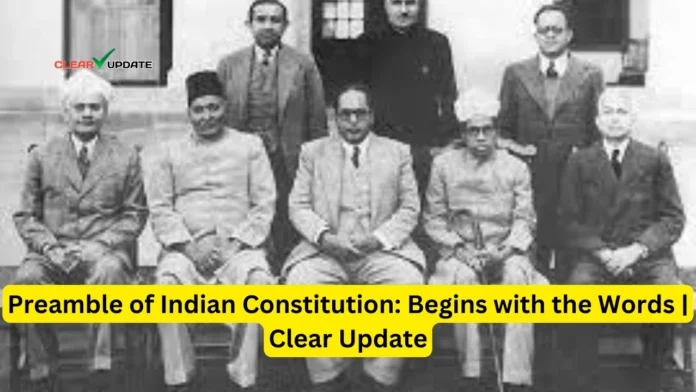Preamble of Indian Constitution
The Preamble to the Constitution of India was adopted on November 26, 1949, by the Constituent Assembly and came into effect on January 26, 1950, which is celebrated as Republic Day in India. It declares India to be a Sovereign Socialist Secular Democratic Republic committed to Justice, Equality, and Liberty for the people. The Preamble presents the principles of the Constitution and indicates the sources of its authority. It reflects the core constitutional values that embody the Constitution. The opening and last sentences of the Preamble signify the power that is vested in the hands of the people. The Preamble does not grant substantive rights and is not enforceable in the courts, but various Indian courts have engaged with the Preamble and have treated it as guiding light in the interpretation of the Constitution.
The Indian Constitution, as envisioned by Dr. B.R Ambedkar, establishes a unique federal structure, blending unity and diversity. This dual polity consists of the Union at the Centre and the States at the periphery, each wielding sovereign powers delineated by the Constitution. However, the delicate balance between the Centre and the States faces a growing threat in contemporary times.
The Peculiar Federalism of India
Ambedkar highlighted India’s federal nature, noting its normalcy in peacetime but a shift towards unitariness during emergencies. Unlike classical federal structures, India places primacy on the Union’s legislative powers, challenging the conventional power dynamic. Recent Central government rulings intensify this challenge, causing discord between the Centre and the States.
Read Also: Gyanvapi Mosque: ASI Survey Large Hindu Temple Existed Prior | Clear Update
Erosion of Federal Principles
Despite the constitutional vision of ‘Unity in Diversity,’ India witnesses a trend towards ‘oneness.’ Initiatives like ‘One Nation, One Election,’ ‘One Nation, One Tax,’ and the push for a ‘Union Civil Code‘ undermine the essence of federalism, limiting the autonomy of State governments. This erosion extends to fiscal and economic policy spaces, questioning the sustainability of the federal structure.
Read Also: How to Aadhar Card PAN Card link | Clear Update
Threats to Federalism: One Nation, One Election
In the discourse on ‘One Nation, One Election,’ Abhik Bhattacharya, in ‘Is One Nation, One Election A Threat To Federalism?,’ argues against the policy. Citing constitutional experts and political leaders, the article contends that the pursuit of ‘oneness’ may jeopardize federal principles, straining relations between states and the Centre.
Read Also: Veteran leader Karpoori Thakur will be honored with Bharat Ratna | Clear Update
Uniform Civil Code: Seeking Conformity or Uniformity?
The BJP’s push for a Uniform Civil Code (UCC) adds another layer to the federalism debate. In ‘Uniform Civil Code In India: Uniformity Or Conformity?,’ Professor Tanvir Aeijaz questions the prioritization of conformity over uniformity. He explores whether imposing a common civil code aligns with India’s plurinational and multi-religious fabric.
Read Also: FC Barcelona Standings for the Current Season | Clear Update
Secularism Under Siege
The recent ‘national celebration’ of the ‘Ram Temple‘ consecration raises concerns about secularism. In ‘Does Secularism Have A Place In Ritualistic India?,’ Ashutosh Bhardwaj examines the assault on secularism, quoting analyst Abhay Kumar Dubey, who predicts a crisis for secularism in India. The article questions the role of the state in religion and the shrinking representation of minorities.
Read Also: Pradhan Mantri Suryoday Yojana: Know what it is | Clear Update
Financial Policies: GST and Centralization
The implementation of the Goods and Service Tax (GST) becomes a focal point in the federalism discourse. ‘The GST Conundrum’ explores how this policy shift has made states dependent on the Centre for a significant portion of their resources. Experts argue that GST limits states’ revenue-raising abilities, undermining their financial autonomy.
Read Also: vivo iQOO 12 | Specifications | DRT
Republic Day Reflections: A Call for Federal Rejuvenation
As India commemorates the Constitution on Republic Day, the nation stands at a crossroads. The relentless pursuit of centralization threatens the core principles of federalism. The question arises: Is it time for India to engage in a new federal negotiation, or will the gravitational pull towards centralization drown the essence of our Constitution?





[…] Read Also: Preamble of Indian Constitution: Begins with the Words | Clear Update […]